

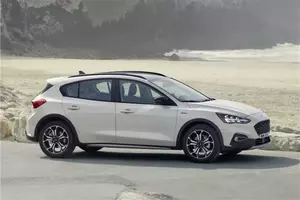
2019 Focus IV Active Hatchback
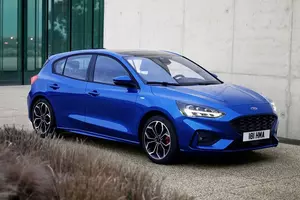
2019 Focus IV Hatchback
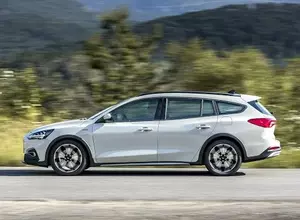
2019 Focus IV Active Wagon

2019 Focus IV Wagon
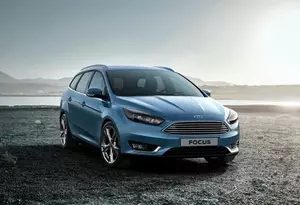
2014 Focus III Wagon (facelift 2014)
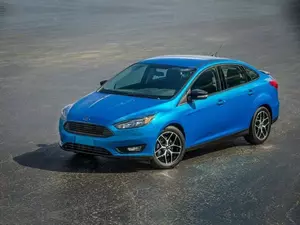
2014 Focus III Sedan (facelift 2014)

2014 Focus III Hatchback (facelift 2014)
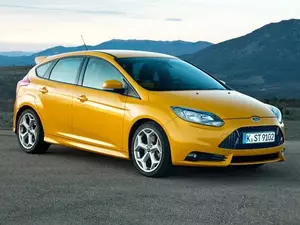
2013 Focus III Hatchback
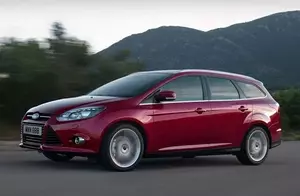
2013 Focus III Wagon

Focus II Hatchback
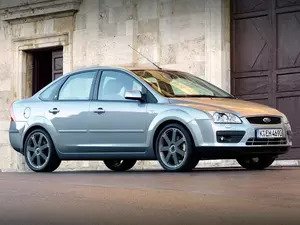
Focus II Sedan
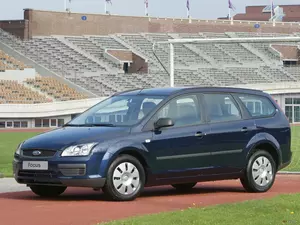
Focus Turnier II

Focus Hatchback I
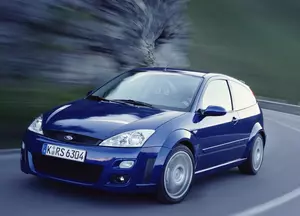
2000 Focus Hatchback (USA)

Focus Turnier I
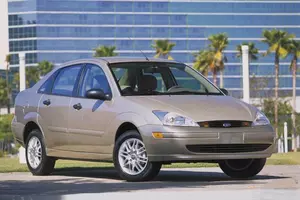
2000 Focus Sedan (USA)
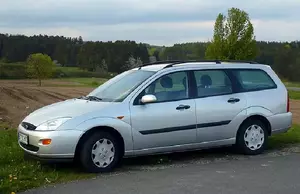
2000 Focus Turnier (USA)
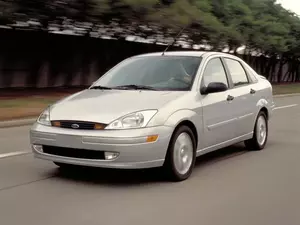
Focus I Sedan

| Vehicle | Curb weight | Difference from world's smallest | Weight to power ratio | 0—60 mph acceleration ratio | Consumption ratio |
|---|---|---|---|---|---|
| 2.0 EcoBlue |
1418 kg / 3127 lbs |
993 kg (2190 lbs) heavier | 9 kg to 1 hp | 175 kg/s (386 lbs/s) |
322 kg/L (710 lbs/L) |
| 1.5 EcoBlue |
1288 kg / 2840 lbs |
863 kg (1903 lbs) heavier | 11 kg to 1 hp | 123 kg/s (271 lbs/s) |
368 kg/L (811 lbs/L) |
| 1.5 EcoBoost |
1329 kg / 2930 lbs |
904 kg (1993 lbs) heavier | 7 kg to 1 hp | 160 kg/s (353 lbs/s) |
225 kg/L (496 lbs/L) |
| 1.0 EcoBoost |
1247 kg / 2750 lbs |
822 kg (1813 lbs) heavier | 10 kg to 1 hp | 123 kg/s (271 lbs/s) |
260 kg/L (573 lbs/L) |
| Vehicle | 2.0 EcoBlue |
|---|---|
| Curb weight |
1418 kg / 3127 lbs |
| Difference from world's smallest | 993 kg (993 lbs) heavier |
| Weight to power ratio | 9 kg to 1 hp |
| 0—60 mph acceleration ratio | 175 kg/s (386 lbs/s) |
| Consumption ratio |
322 kg/L (710 lbs/L) |
| Vehicle | 1.5 EcoBlue |
| Curb weight |
1288 kg / 2840 lbs |
| Difference from world's smallest | 863 kg (863 lbs) heavier |
| Weight to power ratio | 11 kg to 1 hp |
| 0—60 mph acceleration ratio | 123 kg/s (271 lbs/s) |
| Consumption ratio |
368 kg/L (811 lbs/L) |
| Vehicle | 1.5 EcoBoost |
| Curb weight |
1329 kg / 2930 lbs |
| Difference from world's smallest | 904 kg (904 lbs) heavier |
| Weight to power ratio | 7 kg to 1 hp |
| 0—60 mph acceleration ratio | 160 kg/s (353 lbs/s) |
| Consumption ratio |
225 kg/L (496 lbs/L) |
| Vehicle | 1.0 EcoBoost |
| Curb weight |
1247 kg / 2750 lbs |
| Difference from world's smallest | 822 kg (822 lbs) heavier |
| Weight to power ratio | 10 kg to 1 hp |
| 0—60 mph acceleration ratio | 123 kg/s (271 lbs/s) |
| Consumption ratio |
260 kg/L (573 lbs/L) |

| Vehicle | Curb weight | Difference from world's smallest | Weight to power ratio | 0—60 mph acceleration ratio | Consumption ratio |
|---|---|---|---|---|---|
| 1.0 EcoBoost |
1247 kg / 2750 lbs |
822 kg (1813 lbs) heavier | 10 kg to 1 hp | 131 kg/s (289 lbs/s) |
260 kg/L (573 lbs/L) |
| 1.5 EcoBoost |
1329 kg / 2930 lbs |
904 kg (1993 lbs) heavier | 9 kg to 1 hp | 156 kg/s (344 lbs/s) |
225 kg/L (496 lbs/L) |
| 1.5 EcoBlue |
1288 kg / 2840 lbs |
863 kg (1903 lbs) heavier | 11 kg to 1 hp | 136 kg/s (300 lbs/s) |
358 kg/L (789 lbs/L) |
| 2.0 EcoBlue |
1443 kg / 3182 lbs |
1018 kg (2245 lbs) heavier | 10 kg to 1 hp | 164 kg/s (362 lbs/s) |
328 kg/L (723 lbs/L) |
| ST 2.3 EcoBoost |
1459 kg / 3217 lbs |
1034 kg (2280 lbs) heavier | 5 kg to 1 hp | - | - |
| ST 2.0 EcoBlue |
1473 kg / 3248 lbs |
1048 kg (2311 lbs) heavier | 8 kg to 1 hp | 205 kg/s (452 lbs/s) |
307 kg/L (677 lbs/L) |
| Vehicle | 1.0 EcoBoost |
|---|---|
| Curb weight |
1247 kg / 2750 lbs |
| Difference from world's smallest | 822 kg (822 lbs) heavier |
| Weight to power ratio | 10 kg to 1 hp |
| 0—60 mph acceleration ratio | 131 kg/s (289 lbs/s) |
| Consumption ratio |
260 kg/L (573 lbs/L) |
| Vehicle | 1.5 EcoBoost |
| Curb weight |
1329 kg / 2930 lbs |
| Difference from world's smallest | 904 kg (904 lbs) heavier |
| Weight to power ratio | 9 kg to 1 hp |
| 0—60 mph acceleration ratio | 156 kg/s (344 lbs/s) |
| Consumption ratio |
225 kg/L (496 lbs/L) |
| Vehicle | 1.5 EcoBlue |
| Curb weight |
1288 kg / 2840 lbs |
| Difference from world's smallest | 863 kg (863 lbs) heavier |
| Weight to power ratio | 11 kg to 1 hp |
| 0—60 mph acceleration ratio | 136 kg/s (300 lbs/s) |
| Consumption ratio |
358 kg/L (789 lbs/L) |
| Vehicle | 2.0 EcoBlue |
| Curb weight |
1443 kg / 3182 lbs |
| Difference from world's smallest | 1018 kg (1018 lbs) heavier |
| Weight to power ratio | 10 kg to 1 hp |
| 0—60 mph acceleration ratio | 164 kg/s (362 lbs/s) |
| Consumption ratio |
328 kg/L (723 lbs/L) |
| Vehicle | ST 2.3 EcoBoost |
| Curb weight |
1459 kg / 3217 lbs |
| Difference from world's smallest | 1034 kg (1034 lbs) heavier |
| Weight to power ratio | 5 kg to 1 hp |
| 0—60 mph acceleration ratio | - |
| Consumption ratio | - |
| Vehicle | ST 2.0 EcoBlue |
| Curb weight |
1473 kg / 3248 lbs |
| Difference from world's smallest | 1048 kg (1048 lbs) heavier |
| Weight to power ratio | 8 kg to 1 hp |
| 0—60 mph acceleration ratio | 205 kg/s (452 lbs/s) |
| Consumption ratio |
307 kg/L (677 lbs/L) |

| Vehicle | Curb weight | Difference from world's smallest | Weight to power ratio | 0—60 mph acceleration ratio | Consumption ratio |
|---|---|---|---|---|---|
| 2.0 EcoBlue |
1484 kg / 3272 lbs |
1059 kg (2335 lbs) heavier | 10 kg to 1 hp | 165 kg/s (364 lbs/s) |
337 kg/L (743 lbs/L) |
| 1.5 EcoBlue |
1338 kg / 2950 lbs |
913 kg (2013 lbs) heavier | 11 kg to 1 hp | 127 kg/s (280 lbs/s) |
362 kg/L (798 lbs/L) |
| 1.5 EcoBoost |
1370 kg / 3021 lbs |
945 kg (2084 lbs) heavier | 8 kg to 1 hp | 161 kg/s (355 lbs/s) |
232 kg/L (512 lbs/L) |
| 1.0 EcoBoost |
1308 kg / 2884 lbs |
883 kg (1947 lbs) heavier | 10 kg to 1 hp | 130 kg/s (287 lbs/s) |
273 kg/L (602 lbs/L) |
| Vehicle | 2.0 EcoBlue |
|---|---|
| Curb weight |
1484 kg / 3272 lbs |
| Difference from world's smallest | 1059 kg (1059 lbs) heavier |
| Weight to power ratio | 10 kg to 1 hp |
| 0—60 mph acceleration ratio | 165 kg/s (364 lbs/s) |
| Consumption ratio |
337 kg/L (743 lbs/L) |
| Vehicle | 1.5 EcoBlue |
| Curb weight |
1338 kg / 2950 lbs |
| Difference from world's smallest | 913 kg (913 lbs) heavier |
| Weight to power ratio | 11 kg to 1 hp |
| 0—60 mph acceleration ratio | 127 kg/s (280 lbs/s) |
| Consumption ratio |
362 kg/L (798 lbs/L) |
| Vehicle | 1.5 EcoBoost |
| Curb weight |
1370 kg / 3021 lbs |
| Difference from world's smallest | 945 kg (945 lbs) heavier |
| Weight to power ratio | 8 kg to 1 hp |
| 0—60 mph acceleration ratio | 161 kg/s (355 lbs/s) |
| Consumption ratio |
232 kg/L (512 lbs/L) |
| Vehicle | 1.0 EcoBoost |
| Curb weight |
1308 kg / 2884 lbs |
| Difference from world's smallest | 883 kg (883 lbs) heavier |
| Weight to power ratio | 10 kg to 1 hp |
| 0—60 mph acceleration ratio | 130 kg/s (287 lbs/s) |
| Consumption ratio |
273 kg/L (602 lbs/L) |

| Vehicle | Curb weight | Difference from world's smallest | Weight to power ratio | 0—60 mph acceleration ratio | Consumption ratio |
|---|---|---|---|---|---|
| 1.0 EcoBoost |
1356 kg / 2990 lbs |
931 kg (2053 lbs) heavier | 11 kg to 1 hp | 126 kg/s (278 lbs/s) |
234 kg/L (516 lbs/L) |
| 1.5 EcoBoost |
1333 kg / 2939 lbs |
908 kg (2002 lbs) heavier | 7 kg to 1 hp | 165 kg/s (364 lbs/s) |
238 kg/L (525 lbs/L) |
| 2.0 EcoBlue |
1484 kg / 3272 lbs |
1059 kg (2335 lbs) heavier | 10 kg to 1 hp | 165 kg/s (364 lbs/s) |
337 kg/L (743 lbs/L) |
| 1.5 EcoBlue |
1379 kg / 3041 lbs |
954 kg (2104 lbs) heavier | 11 kg to 1 hp | 138 kg/s (304 lbs/s) |
306 kg/L (675 lbs/L) |
| ST 2.3 EcoBoost |
1494 kg / 3294 lbs |
1069 kg (2357 lbs) heavier | 5 kg to 1 hp | - | - |
| ST 2.0 EcoBlue |
1510 kg / 3330 lbs |
1085 kg (2393 lbs) heavier | 8 kg to 1 hp | 207 kg/s (456 lbs/s) |
315 kg/L (695 lbs/L) |
| Vehicle | 1.0 EcoBoost |
|---|---|
| Curb weight |
1356 kg / 2990 lbs |
| Difference from world's smallest | 931 kg (931 lbs) heavier |
| Weight to power ratio | 11 kg to 1 hp |
| 0—60 mph acceleration ratio | 126 kg/s (278 lbs/s) |
| Consumption ratio |
234 kg/L (516 lbs/L) |
| Vehicle | 1.5 EcoBoost |
| Curb weight |
1333 kg / 2939 lbs |
| Difference from world's smallest | 908 kg (908 lbs) heavier |
| Weight to power ratio | 7 kg to 1 hp |
| 0—60 mph acceleration ratio | 165 kg/s (364 lbs/s) |
| Consumption ratio |
238 kg/L (525 lbs/L) |
| Vehicle | 2.0 EcoBlue |
| Curb weight |
1484 kg / 3272 lbs |
| Difference from world's smallest | 1059 kg (1059 lbs) heavier |
| Weight to power ratio | 10 kg to 1 hp |
| 0—60 mph acceleration ratio | 165 kg/s (364 lbs/s) |
| Consumption ratio |
337 kg/L (743 lbs/L) |
| Vehicle | 1.5 EcoBlue |
| Curb weight |
1379 kg / 3041 lbs |
| Difference from world's smallest | 954 kg (954 lbs) heavier |
| Weight to power ratio | 11 kg to 1 hp |
| 0—60 mph acceleration ratio | 138 kg/s (304 lbs/s) |
| Consumption ratio |
306 kg/L (675 lbs/L) |
| Vehicle | ST 2.3 EcoBoost |
| Curb weight |
1494 kg / 3294 lbs |
| Difference from world's smallest | 1069 kg (1069 lbs) heavier |
| Weight to power ratio | 5 kg to 1 hp |
| 0—60 mph acceleration ratio | - |
| Consumption ratio | - |
| Vehicle | ST 2.0 EcoBlue |
| Curb weight |
1510 kg / 3330 lbs |
| Difference from world's smallest | 1085 kg (1085 lbs) heavier |
| Weight to power ratio | 8 kg to 1 hp |
| 0—60 mph acceleration ratio | 207 kg/s (456 lbs/s) |
| Consumption ratio |
315 kg/L (695 lbs/L) |

| Vehicle | Curb weight | Difference from world's smallest | Weight to power ratio | 0—60 mph acceleration ratio | Consumption ratio |
|---|---|---|---|---|---|
| 1.0 EcoBoost |
1485 kg / 3274 lbs |
1060 kg (2337 lbs) heavier | 15 kg to 1 hp | 123 kg/s (271 lbs/s) |
309 kg/L (681 lbs/L) |
| 1.5 EcoBoost |
1563 kg / 3446 lbs |
1138 kg (2509 lbs) heavier | 10 kg to 1 hp | 182 kg/s (401 lbs/s) |
279 kg/L (615 lbs/L) |
| 1.6 Ti-VCT |
1473 kg / 3248 lbs |
1048 kg (2311 lbs) heavier | 14 kg to 1 hp | 124 kg/s (273 lbs/s) |
246 kg/L (542 lbs/L) |
| 1.6 TDCi |
1530 kg / 3374 lbs |
1105 kg (2437 lbs) heavier | 16 kg to 1 hp | 126 kg/s (278 lbs/s) |
340 kg/L (750 lbs/L) |
| 2.0 TDCi |
1655 kg / 3649 lbs |
1230 kg (2712 lbs) heavier | 11 kg to 1 hp | 195 kg/s (430 lbs/s) |
376 kg/L (829 lbs/L) |
| 1.5 TDCi |
1564 kg / 3449 lbs |
1139 kg (2512 lbs) heavier | 13 kg to 1 hp | 153 kg/s (337 lbs/s) |
412 kg/L (908 lbs/L) |
| ST 2.0 TDCi |
1488 kg / 3281 lbs |
1063 kg (2344 lbs) heavier | 8 kg to 1 hp | 193 kg/s (426 lbs/s) |
338 kg/L (745 lbs/L) |
| ST 2.0 EcoBoost |
1461 kg / 3222 lbs |
1036 kg (2285 lbs) heavier | 6 kg to 1 hp | 228 kg/s (503 lbs/s) |
215 kg/L (474 lbs/L) |
| Vehicle | 1.0 EcoBoost |
|---|---|
| Curb weight |
1485 kg / 3274 lbs |
| Difference from world's smallest | 1060 kg (1060 lbs) heavier |
| Weight to power ratio | 15 kg to 1 hp |
| 0—60 mph acceleration ratio | 123 kg/s (271 lbs/s) |
| Consumption ratio |
309 kg/L (681 lbs/L) |
| Vehicle | 1.5 EcoBoost |
| Curb weight |
1563 kg / 3446 lbs |
| Difference from world's smallest | 1138 kg (1138 lbs) heavier |
| Weight to power ratio | 10 kg to 1 hp |
| 0—60 mph acceleration ratio | 182 kg/s (401 lbs/s) |
| Consumption ratio |
279 kg/L (615 lbs/L) |
| Vehicle | 1.6 Ti-VCT |
| Curb weight |
1473 kg / 3248 lbs |
| Difference from world's smallest | 1048 kg (1048 lbs) heavier |
| Weight to power ratio | 14 kg to 1 hp |
| 0—60 mph acceleration ratio | 124 kg/s (273 lbs/s) |
| Consumption ratio |
246 kg/L (542 lbs/L) |
| Vehicle | 1.6 TDCi |
| Curb weight |
1530 kg / 3374 lbs |
| Difference from world's smallest | 1105 kg (1105 lbs) heavier |
| Weight to power ratio | 16 kg to 1 hp |
| 0—60 mph acceleration ratio | 126 kg/s (278 lbs/s) |
| Consumption ratio |
340 kg/L (750 lbs/L) |
| Vehicle | 2.0 TDCi |
| Curb weight |
1655 kg / 3649 lbs |
| Difference from world's smallest | 1230 kg (1230 lbs) heavier |
| Weight to power ratio | 11 kg to 1 hp |
| 0—60 mph acceleration ratio | 195 kg/s (430 lbs/s) |
| Consumption ratio |
376 kg/L (829 lbs/L) |
| Vehicle | 1.5 TDCi |
| Curb weight |
1564 kg / 3449 lbs |
| Difference from world's smallest | 1139 kg (1139 lbs) heavier |
| Weight to power ratio | 13 kg to 1 hp |
| 0—60 mph acceleration ratio | 153 kg/s (337 lbs/s) |
| Consumption ratio |
412 kg/L (908 lbs/L) |
| Vehicle | ST 2.0 TDCi |
| Curb weight |
1488 kg / 3281 lbs |
| Difference from world's smallest | 1063 kg (1063 lbs) heavier |
| Weight to power ratio | 8 kg to 1 hp |
| 0—60 mph acceleration ratio | 193 kg/s (426 lbs/s) |
| Consumption ratio |
338 kg/L (745 lbs/L) |
| Vehicle | ST 2.0 EcoBoost |
| Curb weight |
1461 kg / 3222 lbs |
| Difference from world's smallest | 1036 kg (1036 lbs) heavier |
| Weight to power ratio | 6 kg to 1 hp |
| 0—60 mph acceleration ratio | 228 kg/s (503 lbs/s) |
| Consumption ratio |
215 kg/L (474 lbs/L) |

| Vehicle | Curb weight | Difference from world's smallest | Weight to power ratio | 0—60 mph acceleration ratio | Consumption ratio |
|---|---|---|---|---|---|
| 1.0 EcoBoost |
1334 kg / 2941 lbs |
909 kg (2004 lbs) heavier | 11 kg to 1 hp | 127 kg/s (280 lbs/s) |
278 kg/L (613 lbs/L) |
| 1.5 EcoBoost |
1358 kg / 2994 lbs |
933 kg (2057 lbs) heavier | 7 kg to 1 hp | 164 kg/s (362 lbs/s) |
243 kg/L (536 lbs/L) |
| 1.6 Ti-VCT |
1318 kg / 2906 lbs |
893 kg (1969 lbs) heavier | 11 kg to 1 hp | 118 kg/s (260 lbs/s) |
209 kg/L (461 lbs/L) |
| 1.5 TDCi |
1350 kg / 2977 lbs |
925 kg (2040 lbs) heavier | 11 kg to 1 hp | 134 kg/s (295 lbs/s) |
355 kg/L (783 lbs/L) |
| 1.6 TDCi |
1343 kg / 2961 lbs |
918 kg (2024 lbs) heavier | 12 kg to 1 hp | 129 kg/s (284 lbs/s) |
298 kg/L (657 lbs/L) |
| 2.0 TDCi |
1462 kg / 3224 lbs |
1037 kg (2287 lbs) heavier | 10 kg to 1 hp | 176 kg/s (388 lbs/s) |
305 kg/L (673 lbs/L) |
| Vehicle | 1.0 EcoBoost |
|---|---|
| Curb weight |
1334 kg / 2941 lbs |
| Difference from world's smallest | 909 kg (909 lbs) heavier |
| Weight to power ratio | 11 kg to 1 hp |
| 0—60 mph acceleration ratio | 127 kg/s (280 lbs/s) |
| Consumption ratio |
278 kg/L (613 lbs/L) |
| Vehicle | 1.5 EcoBoost |
| Curb weight |
1358 kg / 2994 lbs |
| Difference from world's smallest | 933 kg (933 lbs) heavier |
| Weight to power ratio | 7 kg to 1 hp |
| 0—60 mph acceleration ratio | 164 kg/s (362 lbs/s) |
| Consumption ratio |
243 kg/L (536 lbs/L) |
| Vehicle | 1.6 Ti-VCT |
| Curb weight |
1318 kg / 2906 lbs |
| Difference from world's smallest | 893 kg (893 lbs) heavier |
| Weight to power ratio | 11 kg to 1 hp |
| 0—60 mph acceleration ratio | 118 kg/s (260 lbs/s) |
| Consumption ratio |
209 kg/L (461 lbs/L) |
| Vehicle | 1.5 TDCi |
| Curb weight |
1350 kg / 2977 lbs |
| Difference from world's smallest | 925 kg (925 lbs) heavier |
| Weight to power ratio | 11 kg to 1 hp |
| 0—60 mph acceleration ratio | 134 kg/s (295 lbs/s) |
| Consumption ratio |
355 kg/L (783 lbs/L) |
| Vehicle | 1.6 TDCi |
| Curb weight |
1343 kg / 2961 lbs |
| Difference from world's smallest | 918 kg (918 lbs) heavier |
| Weight to power ratio | 12 kg to 1 hp |
| 0—60 mph acceleration ratio | 129 kg/s (284 lbs/s) |
| Consumption ratio |
298 kg/L (657 lbs/L) |
| Vehicle | 2.0 TDCi |
| Curb weight |
1462 kg / 3224 lbs |
| Difference from world's smallest | 1037 kg (1037 lbs) heavier |
| Weight to power ratio | 10 kg to 1 hp |
| 0—60 mph acceleration ratio | 176 kg/s (388 lbs/s) |
| Consumption ratio |
305 kg/L (673 lbs/L) |

| Vehicle | Curb weight | Difference from world's smallest | Weight to power ratio | 0—60 mph acceleration ratio | Consumption ratio |
|---|---|---|---|---|---|
| RS 2.3 EcoBoost |
1524 kg / 3360 lbs |
1099 kg (2423 lbs) heavier | 4 kg to 1 hp | 339 kg/s (747 lbs/s) |
198 kg/L (437 lbs/L) |
| 33.5 kWh |
1651 kg / 3640 lbs |
1226 kg (2703 lbs) heavier | 11 kg to 1 hp | 153 kg/s (337 lbs/s) | - |
| 1.0 EcoBoost |
1327 kg / 2926 lbs |
902 kg (1989 lbs) heavier | 11 kg to 1 hp | 126 kg/s (278 lbs/s) |
282 kg/L (622 lbs/L) |
| 1.5 EcoBoost |
1325 kg / 2922 lbs |
900 kg (1985 lbs) heavier | 7 kg to 1 hp | 162 kg/s (357 lbs/s) |
241 kg/L (531 lbs/L) |
| 1.5 TDCi |
1343 kg / 2961 lbs |
918 kg (2024 lbs) heavier | 11 kg to 1 hp | 134 kg/s (295 lbs/s) |
353 kg/L (778 lbs/L) |
| 1.6 Ti-VCT |
1264 kg / 2787 lbs |
839 kg (1850 lbs) heavier | 12 kg to 1 hp | 108 kg/s (238 lbs/s) |
214 kg/L (472 lbs/L) |
| 1.6 TDCi |
1332 kg / 2937 lbs |
907 kg (2000 lbs) heavier | 14 kg to 1 hp | 112 kg/s (247 lbs/s) |
296 kg/L (653 lbs/L) |
| 2.0 TDCi |
1455 kg / 3208 lbs |
1030 kg (2271 lbs) heavier | 10 kg to 1 hp | 175 kg/s (386 lbs/s) |
303 kg/L (668 lbs/L) |
| ST 2.0 EcoBoost |
1437 kg / 3169 lbs |
1012 kg (2232 lbs) heavier | 6 kg to 1 hp | 232 kg/s (512 lbs/s) |
211 kg/L (465 lbs/L) |
| ST 2.0 TDCi |
1464 kg / 3228 lbs |
1039 kg (2291 lbs) heavier | 8 kg to 1 hp | 190 kg/s (419 lbs/s) |
333 kg/L (734 lbs/L) |
| Vehicle | RS 2.3 EcoBoost |
|---|---|
| Curb weight |
1524 kg / 3360 lbs |
| Difference from world's smallest | 1099 kg (1099 lbs) heavier |
| Weight to power ratio | 4 kg to 1 hp |
| 0—60 mph acceleration ratio | 339 kg/s (747 lbs/s) |
| Consumption ratio |
198 kg/L (437 lbs/L) |
| Vehicle | 33.5 kWh |
| Curb weight |
1651 kg / 3640 lbs |
| Difference from world's smallest | 1226 kg (1226 lbs) heavier |
| Weight to power ratio | 11 kg to 1 hp |
| 0—60 mph acceleration ratio | 153 kg/s (337 lbs/s) |
| Consumption ratio | - |
| Vehicle | 1.0 EcoBoost |
| Curb weight |
1327 kg / 2926 lbs |
| Difference from world's smallest | 902 kg (902 lbs) heavier |
| Weight to power ratio | 11 kg to 1 hp |
| 0—60 mph acceleration ratio | 126 kg/s (278 lbs/s) |
| Consumption ratio |
282 kg/L (622 lbs/L) |
| Vehicle | 1.5 EcoBoost |
| Curb weight |
1325 kg / 2922 lbs |
| Difference from world's smallest | 900 kg (900 lbs) heavier |
| Weight to power ratio | 7 kg to 1 hp |
| 0—60 mph acceleration ratio | 162 kg/s (357 lbs/s) |
| Consumption ratio |
241 kg/L (531 lbs/L) |
| Vehicle | 1.5 TDCi |
| Curb weight |
1343 kg / 2961 lbs |
| Difference from world's smallest | 918 kg (918 lbs) heavier |
| Weight to power ratio | 11 kg to 1 hp |
| 0—60 mph acceleration ratio | 134 kg/s (295 lbs/s) |
| Consumption ratio |
353 kg/L (778 lbs/L) |
| Vehicle | 1.6 Ti-VCT |
| Curb weight |
1264 kg / 2787 lbs |
| Difference from world's smallest | 839 kg (839 lbs) heavier |
| Weight to power ratio | 12 kg to 1 hp |
| 0—60 mph acceleration ratio | 108 kg/s (238 lbs/s) |
| Consumption ratio |
214 kg/L (472 lbs/L) |
| Vehicle | 1.6 TDCi |
| Curb weight |
1332 kg / 2937 lbs |
| Difference from world's smallest | 907 kg (907 lbs) heavier |
| Weight to power ratio | 14 kg to 1 hp |
| 0—60 mph acceleration ratio | 112 kg/s (247 lbs/s) |
| Consumption ratio |
296 kg/L (653 lbs/L) |
| Vehicle | 2.0 TDCi |
| Curb weight |
1455 kg / 3208 lbs |
| Difference from world's smallest | 1030 kg (1030 lbs) heavier |
| Weight to power ratio | 10 kg to 1 hp |
| 0—60 mph acceleration ratio | 175 kg/s (386 lbs/s) |
| Consumption ratio |
303 kg/L (668 lbs/L) |
| Vehicle | ST 2.0 EcoBoost |
| Curb weight |
1437 kg / 3169 lbs |
| Difference from world's smallest | 1012 kg (1012 lbs) heavier |
| Weight to power ratio | 6 kg to 1 hp |
| 0—60 mph acceleration ratio | 232 kg/s (512 lbs/s) |
| Consumption ratio |
211 kg/L (465 lbs/L) |
| Vehicle | ST 2.0 TDCi |
| Curb weight |
1464 kg / 3228 lbs |
| Difference from world's smallest | 1039 kg (1039 lbs) heavier |
| Weight to power ratio | 8 kg to 1 hp |
| 0—60 mph acceleration ratio | 190 kg/s (419 lbs/s) |
| Consumption ratio |
333 kg/L (734 lbs/L) |

| Vehicle | Curb weight | Difference from world's smallest | Weight to power ratio | 0—60 mph acceleration ratio | Consumption ratio |
|---|---|---|---|---|---|
| ST 2.0 EcoBoost |
1362 kg / 3003 lbs |
937 kg (2066 lbs) heavier | 5 kg to 1 hp | 220 kg/s (485 lbs/s) |
189 kg/L (417 lbs/L) |
| Vehicle | ST 2.0 EcoBoost |
|---|---|
| Curb weight |
1362 kg / 3003 lbs |
| Difference from world's smallest | 937 kg (937 lbs) heavier |
| Weight to power ratio | 5 kg to 1 hp |
| 0—60 mph acceleration ratio | 220 kg/s (485 lbs/s) |
| Consumption ratio |
189 kg/L (417 lbs/L) |

| Vehicle | Curb weight | Difference from world's smallest | Weight to power ratio | 0—60 mph acceleration ratio | Consumption ratio |
|---|---|---|---|---|---|
| 1.6 Ti-VCT |
1312 kg / 2893 lbs |
887 kg (1956 lbs) heavier | 10 kg to 1 hp | 125 kg/s (276 lbs/s) |
219 kg/L (483 lbs/L) |
| 1.6 EcoBoost |
1357 kg / 2992 lbs |
932 kg (2055 lbs) heavier | 7 kg to 1 hp | 176 kg/s (388 lbs/s) |
226 kg/L (498 lbs/L) |
| 2.0 TDCi |
1471 kg / 3244 lbs |
1046 kg (2307 lbs) heavier | 9 kg to 1 hp | 171 kg/s (377 lbs/s) |
278 kg/L (613 lbs/L) |
| 1.6 TDCi |
1368 kg / 3016 lbs |
943 kg (2079 lbs) heavier | 12 kg to 1 hp | 130 kg/s (287 lbs/s) |
326 kg/L (719 lbs/L) |
| ST 2.0 EcoBoost |
1386 kg / 3056 lbs |
961 kg (2119 lbs) heavier | 6 kg to 1 hp | 224 kg/s (494 lbs/s) |
193 kg/L (426 lbs/L) |
| Vehicle | 1.6 Ti-VCT |
|---|---|
| Curb weight |
1312 kg / 2893 lbs |
| Difference from world's smallest | 887 kg (887 lbs) heavier |
| Weight to power ratio | 10 kg to 1 hp |
| 0—60 mph acceleration ratio | 125 kg/s (276 lbs/s) |
| Consumption ratio |
219 kg/L (483 lbs/L) |
| Vehicle | 1.6 EcoBoost |
| Curb weight |
1357 kg / 2992 lbs |
| Difference from world's smallest | 932 kg (932 lbs) heavier |
| Weight to power ratio | 7 kg to 1 hp |
| 0—60 mph acceleration ratio | 176 kg/s (388 lbs/s) |
| Consumption ratio |
226 kg/L (498 lbs/L) |
| Vehicle | 2.0 TDCi |
| Curb weight |
1471 kg / 3244 lbs |
| Difference from world's smallest | 1046 kg (1046 lbs) heavier |
| Weight to power ratio | 9 kg to 1 hp |
| 0—60 mph acceleration ratio | 171 kg/s (377 lbs/s) |
| Consumption ratio |
278 kg/L (613 lbs/L) |
| Vehicle | 1.6 TDCi |
| Curb weight |
1368 kg / 3016 lbs |
| Difference from world's smallest | 943 kg (943 lbs) heavier |
| Weight to power ratio | 12 kg to 1 hp |
| 0—60 mph acceleration ratio | 130 kg/s (287 lbs/s) |
| Consumption ratio |
326 kg/L (719 lbs/L) |
| Vehicle | ST 2.0 EcoBoost |
| Curb weight |
1386 kg / 3056 lbs |
| Difference from world's smallest | 961 kg (961 lbs) heavier |
| Weight to power ratio | 6 kg to 1 hp |
| 0—60 mph acceleration ratio | 224 kg/s (494 lbs/s) |
| Consumption ratio |
193 kg/L (426 lbs/L) |

| Vehicle | Curb weight | Difference from world's smallest | Weight to power ratio | 0—60 mph acceleration ratio | Consumption ratio |
|---|---|---|---|---|---|
| 1.4 Duratec 16V |
1245 kg / 2745 lbs |
820 kg (1808 lbs) heavier | 16 kg to 1 hp | 93 kg/s (205 lbs/s) |
189 kg/L (417 lbs/L) |
| 1.6 Duratec 16V |
1242 kg / 2739 lbs |
817 kg (1802 lbs) heavier | 12 kg to 1 hp | 110 kg/s (243 lbs/s) |
185 kg/L (408 lbs/L) |
| 1.8 TDCi |
1357 kg / 2992 lbs |
932 kg (2055 lbs) heavier | 12 kg to 1 hp | 132 kg/s (291 lbs/s) |
261 kg/L (576 lbs/L) |
| 1.6 Duratec Ti-VCR 16V |
1255 kg / 2767 lbs |
830 kg (1830 lbs) heavier | 11 kg to 1 hp | 122 kg/s (269 lbs/s) |
196 kg/L (432 lbs/L) |
| 2.0 Duratec 16V |
1326 kg / 2924 lbs |
901 kg (1987 lbs) heavier | 9 kg to 1 hp | 152 kg/s (335 lbs/s) |
187 kg/L (412 lbs/L) |
| 1.6 TDCi |
1290 kg / 2844 lbs |
865 kg (1907 lbs) heavier | 14 kg to 1 hp | 108 kg/s (238 lbs/s) | - |
| 1.6 TDCi HP |
1295 kg / 2855 lbs |
870 kg (1918 lbs) heavier | 12 kg to 1 hp | 125 kg/s (276 lbs/s) |
249 kg/L (549 lbs/L) |
| 1.8 i 16V |
1265 kg / 2789 lbs |
840 kg (1852 lbs) heavier | 10 kg to 1 hp | 127 kg/s (280 lbs/s) | - |
| 2.0 16V |
1326 kg / 2924 lbs |
901 kg (1987 lbs) heavier | 9 kg to 1 hp | 130 kg/s (287 lbs/s) |
149 kg/L (329 lbs/L) |
| 2.0 TDCi |
1335 kg / 2944 lbs |
910 kg (2007 lbs) heavier | 10 kg to 1 hp | 152 kg/s (335 lbs/s) | - |
| ST 2.5 i 20V |
1392 kg / 3069 lbs |
967 kg (2132 lbs) heavier | 6 kg to 1 hp | 214 kg/s (472 lbs/s) |
150 kg/L (331 lbs/L) |
| RS 2.5 |
1468 kg / 3237 lbs |
1043 kg (2300 lbs) heavier | 5 kg to 1 hp | 262 kg/s (578 lbs/s) |
156 kg/L (344 lbs/L) |
| Vehicle | 1.4 Duratec 16V |
|---|---|
| Curb weight |
1245 kg / 2745 lbs |
| Difference from world's smallest | 820 kg (820 lbs) heavier |
| Weight to power ratio | 16 kg to 1 hp |
| 0—60 mph acceleration ratio | 93 kg/s (205 lbs/s) |
| Consumption ratio |
189 kg/L (417 lbs/L) |
| Vehicle | 1.6 Duratec 16V |
| Curb weight |
1242 kg / 2739 lbs |
| Difference from world's smallest | 817 kg (817 lbs) heavier |
| Weight to power ratio | 12 kg to 1 hp |
| 0—60 mph acceleration ratio | 110 kg/s (243 lbs/s) |
| Consumption ratio |
185 kg/L (408 lbs/L) |
| Vehicle | 1.8 TDCi |
| Curb weight |
1357 kg / 2992 lbs |
| Difference from world's smallest | 932 kg (932 lbs) heavier |
| Weight to power ratio | 12 kg to 1 hp |
| 0—60 mph acceleration ratio | 132 kg/s (291 lbs/s) |
| Consumption ratio |
261 kg/L (576 lbs/L) |
| Vehicle | 1.6 Duratec Ti-VCR 16V |
| Curb weight |
1255 kg / 2767 lbs |
| Difference from world's smallest | 830 kg (830 lbs) heavier |
| Weight to power ratio | 11 kg to 1 hp |
| 0—60 mph acceleration ratio | 122 kg/s (269 lbs/s) |
| Consumption ratio |
196 kg/L (432 lbs/L) |
| Vehicle | 2.0 Duratec 16V |
| Curb weight |
1326 kg / 2924 lbs |
| Difference from world's smallest | 901 kg (901 lbs) heavier |
| Weight to power ratio | 9 kg to 1 hp |
| 0—60 mph acceleration ratio | 152 kg/s (335 lbs/s) |
| Consumption ratio |
187 kg/L (412 lbs/L) |
| Vehicle | 1.6 TDCi |
| Curb weight |
1290 kg / 2844 lbs |
| Difference from world's smallest | 865 kg (865 lbs) heavier |
| Weight to power ratio | 14 kg to 1 hp |
| 0—60 mph acceleration ratio | 108 kg/s (238 lbs/s) |
| Consumption ratio | - |
| Vehicle | 1.6 TDCi HP |
| Curb weight |
1295 kg / 2855 lbs |
| Difference from world's smallest | 870 kg (870 lbs) heavier |
| Weight to power ratio | 12 kg to 1 hp |
| 0—60 mph acceleration ratio | 125 kg/s (276 lbs/s) |
| Consumption ratio |
249 kg/L (549 lbs/L) |
| Vehicle | 1.8 i 16V |
| Curb weight |
1265 kg / 2789 lbs |
| Difference from world's smallest | 840 kg (840 lbs) heavier |
| Weight to power ratio | 10 kg to 1 hp |
| 0—60 mph acceleration ratio | 127 kg/s (280 lbs/s) |
| Consumption ratio | - |
| Vehicle | 2.0 16V |
| Curb weight |
1326 kg / 2924 lbs |
| Difference from world's smallest | 901 kg (901 lbs) heavier |
| Weight to power ratio | 9 kg to 1 hp |
| 0—60 mph acceleration ratio | 130 kg/s (287 lbs/s) |
| Consumption ratio |
149 kg/L (329 lbs/L) |
| Vehicle | 2.0 TDCi |
| Curb weight |
1335 kg / 2944 lbs |
| Difference from world's smallest | 910 kg (910 lbs) heavier |
| Weight to power ratio | 10 kg to 1 hp |
| 0—60 mph acceleration ratio | 152 kg/s (335 lbs/s) |
| Consumption ratio | - |
| Vehicle | ST 2.5 i 20V |
| Curb weight |
1392 kg / 3069 lbs |
| Difference from world's smallest | 967 kg (967 lbs) heavier |
| Weight to power ratio | 6 kg to 1 hp |
| 0—60 mph acceleration ratio | 214 kg/s (472 lbs/s) |
| Consumption ratio |
150 kg/L (331 lbs/L) |
| Vehicle | RS 2.5 |
| Curb weight |
1468 kg / 3237 lbs |
| Difference from world's smallest | 1043 kg (1043 lbs) heavier |
| Weight to power ratio | 5 kg to 1 hp |
| 0—60 mph acceleration ratio | 262 kg/s (578 lbs/s) |
| Consumption ratio |
156 kg/L (344 lbs/L) |

| Vehicle | Curb weight | Difference from world's smallest | Weight to power ratio | 0—60 mph acceleration ratio | Consumption ratio |
|---|---|---|---|---|---|
| 1.6 Duratec 16V |
1195 kg / 2635 lbs |
770 kg (1698 lbs) heavier | 12 kg to 1 hp | 93 kg/s (205 lbs/s) |
159 kg/L (351 lbs/L) |
| 1.4 Duratec 16V |
1195 kg / 2635 lbs |
770 kg (1698 lbs) heavier | 15 kg to 1 hp | 89 kg/s (196 lbs/s) | - |
| 1.6 Duratec Ti-VCR 16V |
1279 kg / 2820 lbs |
854 kg (1883 lbs) heavier | 11 kg to 1 hp | 123 kg/s (271 lbs/s) | - |
| 1.6 TDCi |
1377 kg / 3036 lbs |
952 kg (2099 lbs) heavier | 15 kg to 1 hp | 114 kg/s (251 lbs/s) | - |
| 1.8 TDCi |
1380 kg / 3043 lbs |
955 kg (2106 lbs) heavier | 12 kg to 1 hp | 133 kg/s (293 lbs/s) | - |
| 1.6 TDCi HP |
1310 kg / 2889 lbs |
885 kg (1952 lbs) heavier | 12 kg to 1 hp | 125 kg/s (276 lbs/s) | - |
| 1.8 i 16V |
1295 kg / 2855 lbs |
870 kg (1918 lbs) heavier | 10 kg to 1 hp | 128 kg/s (282 lbs/s) | - |
| 2.0 16V |
1300 kg / 2867 lbs |
875 kg (1930 lbs) heavier | 9 kg to 1 hp | 127 kg/s (280 lbs/s) |
146 kg/L (322 lbs/L) |
| 2.0 Duratec 16V |
1300 kg / 2867 lbs |
875 kg (1930 lbs) heavier | 9 kg to 1 hp | 148 kg/s (326 lbs/s) | - |
| 2.0 TDCi |
1350 kg / 2977 lbs |
925 kg (2040 lbs) heavier | 10 kg to 1 hp | 152 kg/s (335 lbs/s) | - |
| Vehicle | 1.6 Duratec 16V |
|---|---|
| Curb weight |
1195 kg / 2635 lbs |
| Difference from world's smallest | 770 kg (770 lbs) heavier |
| Weight to power ratio | 12 kg to 1 hp |
| 0—60 mph acceleration ratio | 93 kg/s (205 lbs/s) |
| Consumption ratio |
159 kg/L (351 lbs/L) |
| Vehicle | 1.4 Duratec 16V |
| Curb weight |
1195 kg / 2635 lbs |
| Difference from world's smallest | 770 kg (770 lbs) heavier |
| Weight to power ratio | 15 kg to 1 hp |
| 0—60 mph acceleration ratio | 89 kg/s (196 lbs/s) |
| Consumption ratio | - |
| Vehicle | 1.6 Duratec Ti-VCR 16V |
| Curb weight |
1279 kg / 2820 lbs |
| Difference from world's smallest | 854 kg (854 lbs) heavier |
| Weight to power ratio | 11 kg to 1 hp |
| 0—60 mph acceleration ratio | 123 kg/s (271 lbs/s) |
| Consumption ratio | - |
| Vehicle | 1.6 TDCi |
| Curb weight |
1377 kg / 3036 lbs |
| Difference from world's smallest | 952 kg (952 lbs) heavier |
| Weight to power ratio | 15 kg to 1 hp |
| 0—60 mph acceleration ratio | 114 kg/s (251 lbs/s) |
| Consumption ratio | - |
| Vehicle | 1.8 TDCi |
| Curb weight |
1380 kg / 3043 lbs |
| Difference from world's smallest | 955 kg (955 lbs) heavier |
| Weight to power ratio | 12 kg to 1 hp |
| 0—60 mph acceleration ratio | 133 kg/s (293 lbs/s) |
| Consumption ratio | - |
| Vehicle | 1.6 TDCi HP |
| Curb weight |
1310 kg / 2889 lbs |
| Difference from world's smallest | 885 kg (885 lbs) heavier |
| Weight to power ratio | 12 kg to 1 hp |
| 0—60 mph acceleration ratio | 125 kg/s (276 lbs/s) |
| Consumption ratio | - |
| Vehicle | 1.8 i 16V |
| Curb weight |
1295 kg / 2855 lbs |
| Difference from world's smallest | 870 kg (870 lbs) heavier |
| Weight to power ratio | 10 kg to 1 hp |
| 0—60 mph acceleration ratio | 128 kg/s (282 lbs/s) |
| Consumption ratio | - |
| Vehicle | 2.0 16V |
| Curb weight |
1300 kg / 2867 lbs |
| Difference from world's smallest | 875 kg (875 lbs) heavier |
| Weight to power ratio | 9 kg to 1 hp |
| 0—60 mph acceleration ratio | 127 kg/s (280 lbs/s) |
| Consumption ratio |
146 kg/L (322 lbs/L) |
| Vehicle | 2.0 Duratec 16V |
| Curb weight |
1300 kg / 2867 lbs |
| Difference from world's smallest | 875 kg (875 lbs) heavier |
| Weight to power ratio | 9 kg to 1 hp |
| 0—60 mph acceleration ratio | 148 kg/s (326 lbs/s) |
| Consumption ratio | - |
| Vehicle | 2.0 TDCi |
| Curb weight |
1350 kg / 2977 lbs |
| Difference from world's smallest | 925 kg (925 lbs) heavier |
| Weight to power ratio | 10 kg to 1 hp |
| 0—60 mph acceleration ratio | 152 kg/s (335 lbs/s) |
| Consumption ratio | - |

| Vehicle | Curb weight | Difference from world's smallest | Weight to power ratio | 0—60 mph acceleration ratio | Consumption ratio |
|---|---|---|---|---|---|
| 1.4 Duratec 16V |
1277 kg / 2816 lbs |
852 kg (1879 lbs) heavier | 16 kg to 1 hp | 93 kg/s (205 lbs/s) |
193 kg/L (426 lbs/L) |
| 1.6 Duratec 16V |
1294 kg / 2853 lbs |
869 kg (1916 lbs) heavier | 13 kg to 1 hp | 112 kg/s (247 lbs/s) |
193 kg/L (426 lbs/L) |
| 1.6 Duratec Ti-VCR 16V |
1295 kg / 2855 lbs |
870 kg (1918 lbs) heavier | 11 kg to 1 hp | 123 kg/s (271 lbs/s) |
202 kg/L (445 lbs/L) |
| 1.6 TDCi |
1320 kg / 2911 lbs |
895 kg (1974 lbs) heavier | 15 kg to 1 hp | 107 kg/s (236 lbs/s) | - |
| 1.6 TDCi HP |
1325 kg / 2922 lbs |
900 kg (1985 lbs) heavier | 12 kg to 1 hp | 126 kg/s (278 lbs/s) | - |
| 1.8 i 16V |
1310 kg / 2889 lbs |
885 kg (1952 lbs) heavier | 10 kg to 1 hp | 128 kg/s (282 lbs/s) | - |
| 1.8 TDCi |
1391 kg / 3067 lbs |
966 kg (2130 lbs) heavier | 12 kg to 1 hp | 134 kg/s (295 lbs/s) |
262 kg/L (578 lbs/L) |
| 2.0 Duratec 16V |
1383 kg / 3050 lbs |
958 kg (2113 lbs) heavier | 10 kg to 1 hp | 136 kg/s (300 lbs/s) |
155 kg/L (342 lbs/L) |
| 2.0 TDCi |
1385 kg / 3054 lbs |
960 kg (2117 lbs) heavier | 10 kg to 1 hp | 154 kg/s (340 lbs/s) | - |
| Vehicle | 1.4 Duratec 16V |
|---|---|
| Curb weight |
1277 kg / 2816 lbs |
| Difference from world's smallest | 852 kg (852 lbs) heavier |
| Weight to power ratio | 16 kg to 1 hp |
| 0—60 mph acceleration ratio | 93 kg/s (205 lbs/s) |
| Consumption ratio |
193 kg/L (426 lbs/L) |
| Vehicle | 1.6 Duratec 16V |
| Curb weight |
1294 kg / 2853 lbs |
| Difference from world's smallest | 869 kg (869 lbs) heavier |
| Weight to power ratio | 13 kg to 1 hp |
| 0—60 mph acceleration ratio | 112 kg/s (247 lbs/s) |
| Consumption ratio |
193 kg/L (426 lbs/L) |
| Vehicle | 1.6 Duratec Ti-VCR 16V |
| Curb weight |
1295 kg / 2855 lbs |
| Difference from world's smallest | 870 kg (870 lbs) heavier |
| Weight to power ratio | 11 kg to 1 hp |
| 0—60 mph acceleration ratio | 123 kg/s (271 lbs/s) |
| Consumption ratio |
202 kg/L (445 lbs/L) |
| Vehicle | 1.6 TDCi |
| Curb weight |
1320 kg / 2911 lbs |
| Difference from world's smallest | 895 kg (895 lbs) heavier |
| Weight to power ratio | 15 kg to 1 hp |
| 0—60 mph acceleration ratio | 107 kg/s (236 lbs/s) |
| Consumption ratio | - |
| Vehicle | 1.6 TDCi HP |
| Curb weight |
1325 kg / 2922 lbs |
| Difference from world's smallest | 900 kg (900 lbs) heavier |
| Weight to power ratio | 12 kg to 1 hp |
| 0—60 mph acceleration ratio | 126 kg/s (278 lbs/s) |
| Consumption ratio | - |
| Vehicle | 1.8 i 16V |
| Curb weight |
1310 kg / 2889 lbs |
| Difference from world's smallest | 885 kg (885 lbs) heavier |
| Weight to power ratio | 10 kg to 1 hp |
| 0—60 mph acceleration ratio | 128 kg/s (282 lbs/s) |
| Consumption ratio | - |
| Vehicle | 1.8 TDCi |
| Curb weight |
1391 kg / 3067 lbs |
| Difference from world's smallest | 966 kg (966 lbs) heavier |
| Weight to power ratio | 12 kg to 1 hp |
| 0—60 mph acceleration ratio | 134 kg/s (295 lbs/s) |
| Consumption ratio |
262 kg/L (578 lbs/L) |
| Vehicle | 2.0 Duratec 16V |
| Curb weight |
1383 kg / 3050 lbs |
| Difference from world's smallest | 958 kg (958 lbs) heavier |
| Weight to power ratio | 10 kg to 1 hp |
| 0—60 mph acceleration ratio | 136 kg/s (300 lbs/s) |
| Consumption ratio |
155 kg/L (342 lbs/L) |
| Vehicle | 2.0 TDCi |
| Curb weight |
1385 kg / 3054 lbs |
| Difference from world's smallest | 960 kg (960 lbs) heavier |
| Weight to power ratio | 10 kg to 1 hp |
| 0—60 mph acceleration ratio | 154 kg/s (340 lbs/s) |
| Consumption ratio | - |

| Vehicle | Curb weight | Difference from world's smallest | Weight to power ratio | 0—60 mph acceleration ratio | Consumption ratio |
|---|---|---|---|---|---|
| 1.6 16V |
1070 kg / 2359 lbs |
645 kg (1422 lbs) heavier | 11 kg to 1 hp | 101 kg/s (223 lbs/s) |
134 kg/L (295 lbs/L) |
| 2.0 16V |
1146 kg / 2527 lbs |
721 kg (1590 lbs) heavier | 9 kg to 1 hp | 130 kg/s (287 lbs/s) | - |
| 1.4 16V |
1068 kg / 2355 lbs |
643 kg (1418 lbs) heavier | 14 kg to 1 hp | 80 kg/s (176 lbs/s) |
159 kg/L (351 lbs/L) |
| 1.8 DI |
1183 kg / 2609 lbs |
758 kg (1672 lbs) heavier | 16 kg to 1 hp | 85 kg/s (187 lbs/s) |
232 kg/L (512 lbs/L) |
| 1.8 16V |
1125 kg / 2481 lbs |
700 kg (1544 lbs) heavier | 10 kg to 1 hp | 116 kg/s (256 lbs/s) |
148 kg/L (326 lbs/L) |
| 1.8 TDCi |
1279 kg / 2820 lbs |
854 kg (1883 lbs) heavier | 11 kg to 1 hp | 124 kg/s (273 lbs/s) |
237 kg/L (523 lbs/L) |
| 1.8 Turbo DI |
1183 kg / 2609 lbs |
758 kg (1672 lbs) heavier | 13 kg to 1 hp | 100 kg/s (221 lbs/s) |
232 kg/L (512 lbs/L) |
| 2.0 16V ST170 |
1245 kg / 2745 lbs |
820 kg (1808 lbs) heavier | 7 kg to 1 hp | 175 kg/s (386 lbs/s) |
141 kg/L (311 lbs/L) |
| 2.0 i 16V RS |
1210 kg / 2668 lbs |
785 kg (1731 lbs) heavier | 6 kg to 1 hp | 189 kg/s (417 lbs/s) |
120 kg/L (265 lbs/L) |
| Vehicle | 1.6 16V |
|---|---|
| Curb weight |
1070 kg / 2359 lbs |
| Difference from world's smallest | 645 kg (645 lbs) heavier |
| Weight to power ratio | 11 kg to 1 hp |
| 0—60 mph acceleration ratio | 101 kg/s (223 lbs/s) |
| Consumption ratio |
134 kg/L (295 lbs/L) |
| Vehicle | 2.0 16V |
| Curb weight |
1146 kg / 2527 lbs |
| Difference from world's smallest | 721 kg (721 lbs) heavier |
| Weight to power ratio | 9 kg to 1 hp |
| 0—60 mph acceleration ratio | 130 kg/s (287 lbs/s) |
| Consumption ratio | - |
| Vehicle | 1.4 16V |
| Curb weight |
1068 kg / 2355 lbs |
| Difference from world's smallest | 643 kg (643 lbs) heavier |
| Weight to power ratio | 14 kg to 1 hp |
| 0—60 mph acceleration ratio | 80 kg/s (176 lbs/s) |
| Consumption ratio |
159 kg/L (351 lbs/L) |
| Vehicle | 1.8 DI |
| Curb weight |
1183 kg / 2609 lbs |
| Difference from world's smallest | 758 kg (758 lbs) heavier |
| Weight to power ratio | 16 kg to 1 hp |
| 0—60 mph acceleration ratio | 85 kg/s (187 lbs/s) |
| Consumption ratio |
232 kg/L (512 lbs/L) |
| Vehicle | 1.8 16V |
| Curb weight |
1125 kg / 2481 lbs |
| Difference from world's smallest | 700 kg (700 lbs) heavier |
| Weight to power ratio | 10 kg to 1 hp |
| 0—60 mph acceleration ratio | 116 kg/s (256 lbs/s) |
| Consumption ratio |
148 kg/L (326 lbs/L) |
| Vehicle | 1.8 TDCi |
| Curb weight |
1279 kg / 2820 lbs |
| Difference from world's smallest | 854 kg (854 lbs) heavier |
| Weight to power ratio | 11 kg to 1 hp |
| 0—60 mph acceleration ratio | 124 kg/s (273 lbs/s) |
| Consumption ratio |
237 kg/L (523 lbs/L) |
| Vehicle | 1.8 Turbo DI |
| Curb weight |
1183 kg / 2609 lbs |
| Difference from world's smallest | 758 kg (758 lbs) heavier |
| Weight to power ratio | 13 kg to 1 hp |
| 0—60 mph acceleration ratio | 100 kg/s (221 lbs/s) |
| Consumption ratio |
232 kg/L (512 lbs/L) |
| Vehicle | 2.0 16V ST170 |
| Curb weight |
1245 kg / 2745 lbs |
| Difference from world's smallest | 820 kg (820 lbs) heavier |
| Weight to power ratio | 7 kg to 1 hp |
| 0—60 mph acceleration ratio | 175 kg/s (386 lbs/s) |
| Consumption ratio |
141 kg/L (311 lbs/L) |
| Vehicle | 2.0 i 16V RS |
| Curb weight |
1210 kg / 2668 lbs |
| Difference from world's smallest | 785 kg (785 lbs) heavier |
| Weight to power ratio | 6 kg to 1 hp |
| 0—60 mph acceleration ratio | 189 kg/s (417 lbs/s) |
| Consumption ratio |
120 kg/L (265 lbs/L) |

| Vehicle | Curb weight | Difference from world's smallest | Weight to power ratio | 0—60 mph acceleration ratio | Consumption ratio |
|---|---|---|---|---|---|
| 2.0 i 16V SVT |
1270 kg / 2800 lbs |
845 kg (1863 lbs) heavier | 7 kg to 1 hp | 181 kg/s (399 lbs/s) | - |
| 2.0 i 16V ZX3 |
1200 kg / 2646 lbs |
775 kg (1709 lbs) heavier | 9 kg to 1 hp | 140 kg/s (309 lbs/s) | - |
| 2.0 i 16V ZX5 |
1245 kg / 2745 lbs |
820 kg (1808 lbs) heavier | 10 kg to 1 hp | 138 kg/s (304 lbs/s) | - |
| 2.0 i LX |
1190 kg / 2624 lbs |
765 kg (1687 lbs) heavier | 11 kg to 1 hp | 132 kg/s (291 lbs/s) | - |
| Vehicle | 2.0 i 16V SVT |
|---|---|
| Curb weight |
1270 kg / 2800 lbs |
| Difference from world's smallest | 845 kg (845 lbs) heavier |
| Weight to power ratio | 7 kg to 1 hp |
| 0—60 mph acceleration ratio | 181 kg/s (399 lbs/s) |
| Consumption ratio | - |
| Vehicle | 2.0 i 16V ZX3 |
| Curb weight |
1200 kg / 2646 lbs |
| Difference from world's smallest | 775 kg (775 lbs) heavier |
| Weight to power ratio | 9 kg to 1 hp |
| 0—60 mph acceleration ratio | 140 kg/s (309 lbs/s) |
| Consumption ratio | - |
| Vehicle | 2.0 i 16V ZX5 |
| Curb weight |
1245 kg / 2745 lbs |
| Difference from world's smallest | 820 kg (820 lbs) heavier |
| Weight to power ratio | 10 kg to 1 hp |
| 0—60 mph acceleration ratio | 138 kg/s (304 lbs/s) |
| Consumption ratio | - |
| Vehicle | 2.0 i LX |
| Curb weight |
1190 kg / 2624 lbs |
| Difference from world's smallest | 765 kg (765 lbs) heavier |
| Weight to power ratio | 11 kg to 1 hp |
| 0—60 mph acceleration ratio | 132 kg/s (291 lbs/s) |
| Consumption ratio | - |

| Vehicle | Curb weight | Difference from world's smallest | Weight to power ratio | 0—60 mph acceleration ratio | Consumption ratio |
|---|---|---|---|---|---|
| 1.6 16V |
1180 kg / 2602 lbs |
755 kg (1665 lbs) heavier | 12 kg to 1 hp | 112 kg/s (247 lbs/s) |
169 kg/L (373 lbs/L) |
| 1.4 16V |
1115 kg / 2459 lbs |
690 kg (1522 lbs) heavier | 15 kg to 1 hp | 80 kg/s (176 lbs/s) |
169 kg/L (373 lbs/L) |
| 1.8 DI |
1230 kg / 2712 lbs |
805 kg (1775 lbs) heavier | 16 kg to 1 hp | 86 kg/s (190 lbs/s) |
241 kg/L (531 lbs/L) |
| 1.8 16V |
1169 kg / 2578 lbs |
744 kg (1641 lbs) heavier | 10 kg to 1 hp | 115 kg/s (254 lbs/s) |
152 kg/L (335 lbs/L) |
| 1.8 TDCi |
1327 kg / 2926 lbs |
902 kg (1989 lbs) heavier | 12 kg to 1 hp | 129 kg/s (284 lbs/s) |
246 kg/L (542 lbs/L) |
| 2.0 16V |
1195 kg / 2635 lbs |
770 kg (1698 lbs) heavier | 9 kg to 1 hp | 131 kg/s (289 lbs/s) | - |
| 1.8 Turbo DI |
1232 kg / 2717 lbs |
807 kg (1780 lbs) heavier | 14 kg to 1 hp | 104 kg/s (229 lbs/s) |
228 kg/L (503 lbs/L) |
| 2.0 i 16V ST170 |
1280 kg / 2822 lbs |
855 kg (1885 lbs) heavier | 7 kg to 1 hp | 158 kg/s (348 lbs/s) | - |
| Vehicle | 1.6 16V |
|---|---|
| Curb weight |
1180 kg / 2602 lbs |
| Difference from world's smallest | 755 kg (755 lbs) heavier |
| Weight to power ratio | 12 kg to 1 hp |
| 0—60 mph acceleration ratio | 112 kg/s (247 lbs/s) |
| Consumption ratio |
169 kg/L (373 lbs/L) |
| Vehicle | 1.4 16V |
| Curb weight |
1115 kg / 2459 lbs |
| Difference from world's smallest | 690 kg (690 lbs) heavier |
| Weight to power ratio | 15 kg to 1 hp |
| 0—60 mph acceleration ratio | 80 kg/s (176 lbs/s) |
| Consumption ratio |
169 kg/L (373 lbs/L) |
| Vehicle | 1.8 DI |
| Curb weight |
1230 kg / 2712 lbs |
| Difference from world's smallest | 805 kg (805 lbs) heavier |
| Weight to power ratio | 16 kg to 1 hp |
| 0—60 mph acceleration ratio | 86 kg/s (190 lbs/s) |
| Consumption ratio |
241 kg/L (531 lbs/L) |
| Vehicle | 1.8 16V |
| Curb weight |
1169 kg / 2578 lbs |
| Difference from world's smallest | 744 kg (744 lbs) heavier |
| Weight to power ratio | 10 kg to 1 hp |
| 0—60 mph acceleration ratio | 115 kg/s (254 lbs/s) |
| Consumption ratio |
152 kg/L (335 lbs/L) |
| Vehicle | 1.8 TDCi |
| Curb weight |
1327 kg / 2926 lbs |
| Difference from world's smallest | 902 kg (902 lbs) heavier |
| Weight to power ratio | 12 kg to 1 hp |
| 0—60 mph acceleration ratio | 129 kg/s (284 lbs/s) |
| Consumption ratio |
246 kg/L (542 lbs/L) |
| Vehicle | 2.0 16V |
| Curb weight |
1195 kg / 2635 lbs |
| Difference from world's smallest | 770 kg (770 lbs) heavier |
| Weight to power ratio | 9 kg to 1 hp |
| 0—60 mph acceleration ratio | 131 kg/s (289 lbs/s) |
| Consumption ratio | - |
| Vehicle | 1.8 Turbo DI |
| Curb weight |
1232 kg / 2717 lbs |
| Difference from world's smallest | 807 kg (807 lbs) heavier |
| Weight to power ratio | 14 kg to 1 hp |
| 0—60 mph acceleration ratio | 104 kg/s (229 lbs/s) |
| Consumption ratio |
228 kg/L (503 lbs/L) |
| Vehicle | 2.0 i 16V ST170 |
| Curb weight |
1280 kg / 2822 lbs |
| Difference from world's smallest | 855 kg (855 lbs) heavier |
| Weight to power ratio | 7 kg to 1 hp |
| 0—60 mph acceleration ratio | 158 kg/s (348 lbs/s) |
| Consumption ratio | - |

| Vehicle | Curb weight | Difference from world's smallest | Weight to power ratio | 0—60 mph acceleration ratio | Consumption ratio |
|---|---|---|---|---|---|
| 2.0i 16V ZTS |
1250 kg / 2756 lbs |
825 kg (1819 lbs) heavier | 10 kg to 1 hp | 137 kg/s (302 lbs/s) | - |
| 2.0 i LX/SE |
1190 kg / 2624 lbs |
765 kg (1687 lbs) heavier | 11 kg to 1 hp | 113 kg/s (249 lbs/s) | - |
| 2.3 i 16V ST |
1280 kg / 2822 lbs |
855 kg (1885 lbs) heavier | 8 kg to 1 hp | 171 kg/s (377 lbs/s) | - |
| Vehicle | 2.0i 16V ZTS |
|---|---|
| Curb weight |
1250 kg / 2756 lbs |
| Difference from world's smallest | 825 kg (825 lbs) heavier |
| Weight to power ratio | 10 kg to 1 hp |
| 0—60 mph acceleration ratio | 137 kg/s (302 lbs/s) |
| Consumption ratio | - |
| Vehicle | 2.0 i LX/SE |
| Curb weight |
1190 kg / 2624 lbs |
| Difference from world's smallest | 765 kg (765 lbs) heavier |
| Weight to power ratio | 11 kg to 1 hp |
| 0—60 mph acceleration ratio | 113 kg/s (249 lbs/s) |
| Consumption ratio | - |
| Vehicle | 2.3 i 16V ST |
| Curb weight |
1280 kg / 2822 lbs |
| Difference from world's smallest | 855 kg (855 lbs) heavier |
| Weight to power ratio | 8 kg to 1 hp |
| 0—60 mph acceleration ratio | 171 kg/s (377 lbs/s) |
| Consumption ratio | - |

| Vehicle | Curb weight | Difference from world's smallest | Weight to power ratio | 0—60 mph acceleration ratio | Consumption ratio |
|---|---|---|---|---|---|
| 2.0i 16V SE |
1275 kg / 2811 lbs |
850 kg (1874 lbs) heavier | 10 kg to 1 hp | - | - |
| 2.3 i 16V ZXW |
1315 kg / 2900 lbs |
890 kg (1963 lbs) heavier | 9 kg to 1 hp | 178 kg/s (392 lbs/s) | - |
| Vehicle | 2.0i 16V SE |
|---|---|
| Curb weight |
1275 kg / 2811 lbs |
| Difference from world's smallest | 850 kg (850 lbs) heavier |
| Weight to power ratio | 10 kg to 1 hp |
| 0—60 mph acceleration ratio | - |
| Consumption ratio | - |
| Vehicle | 2.3 i 16V ZXW |
| Curb weight |
1315 kg / 2900 lbs |
| Difference from world's smallest | 890 kg (890 lbs) heavier |
| Weight to power ratio | 9 kg to 1 hp |
| 0—60 mph acceleration ratio | 178 kg/s (392 lbs/s) |
| Consumption ratio | - |

| Vehicle | Curb weight | Difference from world's smallest | Weight to power ratio | 0—60 mph acceleration ratio | Consumption ratio |
|---|---|---|---|---|---|
| 1.6 16V |
1091 kg / 2406 lbs |
666 kg (1469 lbs) heavier | 11 kg to 1 hp | 104 kg/s (229 lbs/s) |
156 kg/L (344 lbs/L) |
| 2.0 16V |
1197 kg / 2639 lbs |
772 kg (1702 lbs) heavier | 9 kg to 1 hp | 136 kg/s (300 lbs/s) |
138 kg/L (304 lbs/L) |
| 1.4 16V |
1091 kg / 2406 lbs |
666 kg (1469 lbs) heavier | 15 kg to 1 hp | 80 kg/s (176 lbs/s) |
156 kg/L (344 lbs/L) |
| 1.8 16V |
1145 kg / 2525 lbs |
720 kg (1588 lbs) heavier | 10 kg to 1 hp | 117 kg/s (258 lbs/s) |
153 kg/L (337 lbs/L) |
| 1.8 TDCi |
1300 kg / 2867 lbs |
875 kg (1930 lbs) heavier | 11 kg to 1 hp | 126 kg/s (278 lbs/s) |
241 kg/L (531 lbs/L) |
| 1.8 Turbo DI |
1205 kg / 2657 lbs |
780 kg (1720 lbs) heavier | 13 kg to 1 hp | 85 kg/s (187 lbs/s) |
223 kg/L (492 lbs/L) |
| Vehicle | 1.6 16V |
|---|---|
| Curb weight |
1091 kg / 2406 lbs |
| Difference from world's smallest | 666 kg (666 lbs) heavier |
| Weight to power ratio | 11 kg to 1 hp |
| 0—60 mph acceleration ratio | 104 kg/s (229 lbs/s) |
| Consumption ratio |
156 kg/L (344 lbs/L) |
| Vehicle | 2.0 16V |
| Curb weight |
1197 kg / 2639 lbs |
| Difference from world's smallest | 772 kg (772 lbs) heavier |
| Weight to power ratio | 9 kg to 1 hp |
| 0—60 mph acceleration ratio | 136 kg/s (300 lbs/s) |
| Consumption ratio |
138 kg/L (304 lbs/L) |
| Vehicle | 1.4 16V |
| Curb weight |
1091 kg / 2406 lbs |
| Difference from world's smallest | 666 kg (666 lbs) heavier |
| Weight to power ratio | 15 kg to 1 hp |
| 0—60 mph acceleration ratio | 80 kg/s (176 lbs/s) |
| Consumption ratio |
156 kg/L (344 lbs/L) |
| Vehicle | 1.8 16V |
| Curb weight |
1145 kg / 2525 lbs |
| Difference from world's smallest | 720 kg (720 lbs) heavier |
| Weight to power ratio | 10 kg to 1 hp |
| 0—60 mph acceleration ratio | 117 kg/s (258 lbs/s) |
| Consumption ratio |
153 kg/L (337 lbs/L) |
| Vehicle | 1.8 TDCi |
| Curb weight |
1300 kg / 2867 lbs |
| Difference from world's smallest | 875 kg (875 lbs) heavier |
| Weight to power ratio | 11 kg to 1 hp |
| 0—60 mph acceleration ratio | 126 kg/s (278 lbs/s) |
| Consumption ratio |
241 kg/L (531 lbs/L) |
| Vehicle | 1.8 Turbo DI |
| Curb weight |
1205 kg / 2657 lbs |
| Difference from world's smallest | 780 kg (780 lbs) heavier |
| Weight to power ratio | 13 kg to 1 hp |
| 0—60 mph acceleration ratio | 85 kg/s (187 lbs/s) |
| Consumption ratio |
223 kg/L (492 lbs/L) |